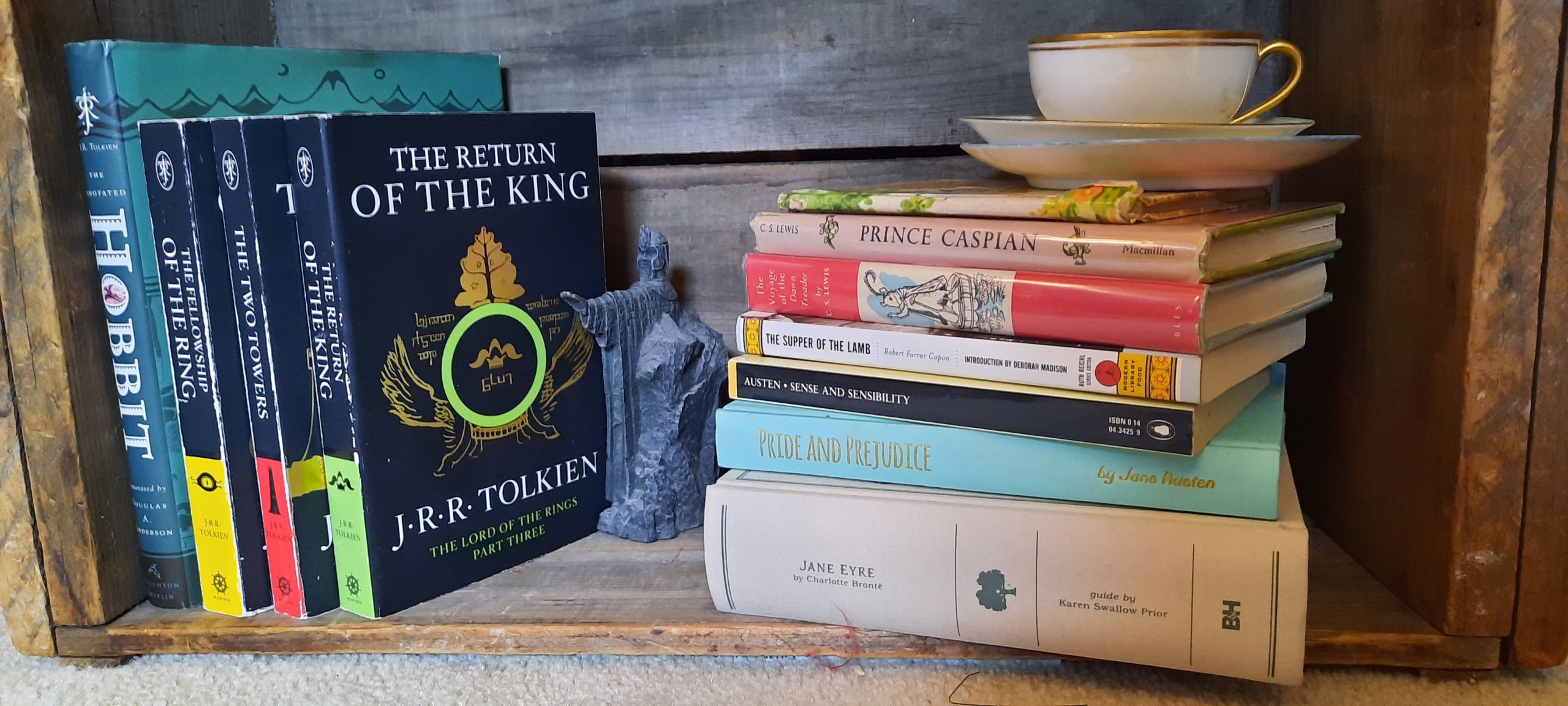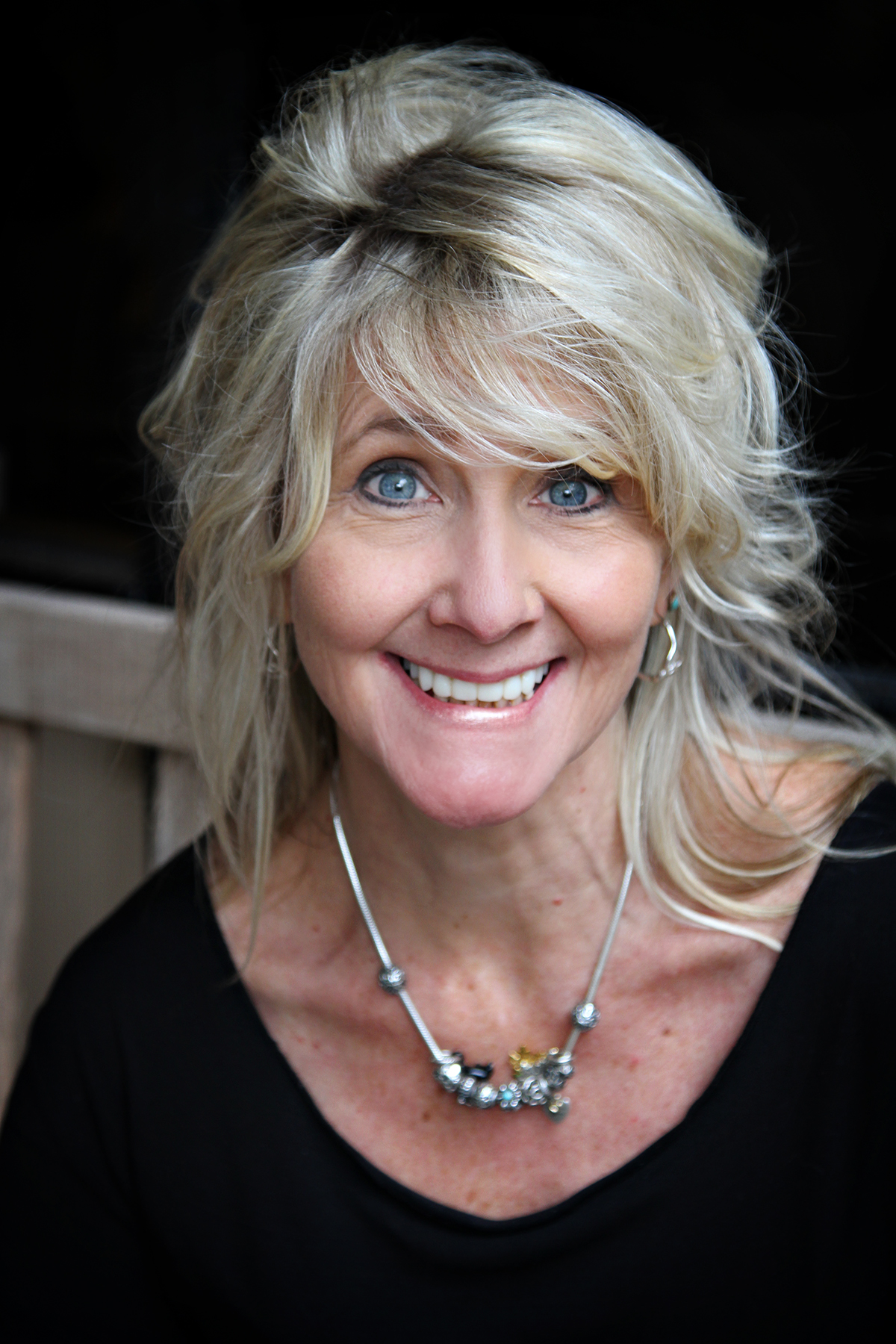Reading is my favorite occupation, when I have leisure for it and books to read.
— Anne Brontë
C. S. Lewis once said to Walter Hooper, his personal secretary, “You can’t get a cup of tea large enough or a book long enough to suit me.” Hooper later reflected, “He certainly meant what he said, for at that moment I was pouring his tea into a very large Cornish-ware cup and he was reading Bleak House.”[1] There is truth to Lewis’s comment; a cup of tea and a good story are good for the soul and the imagination, lifting us out of our ordinary realm and into another time and place. So I invite you to put the kettle on, settle in, and peruse our suggested books for the summer!
For many, this season offers lighter schedules, leisure time, and potential vacations. We’ve chosen several books that welcome the opportunity for a deep read — to get lost in the transcendent Rivendell, walk through the dewy grass to Pemberley, or meet magical beings who renew your courage.
‘Come dear folk!’ she said, taking Frodo by the hand. ‘Laugh and be merry! I am Goldberry, daughter of the River.’ Then lightly she passed them and closing the door she turned her back to it, with her white arms spread out across it. ‘Let us shut out the night!’ she said. ‘For you are still afraid, perhaps, of mist and treeshadows and deep water, and untame things. Fear nothing! For tonight you are under the roof of Tom Bombadil.’ — J.R.R. Tolkien, “In the House of Tom Bombadil,” The Fellowship of the Ring
The selections for this summer probably include a few of those on your ‘To Be Read’ list, especially the lengthy classics like Jane Eyre and Lord of the Rings. My focus for this season is classic literature. You will also note that good and timeless classics for children are also included here and in my other essay “Marginalia,” but they aren’t just for little people. Lewis mentions in “On Stories” that “No book is really worth reading at the age of ten which is not equally (and often far more) worth reading at the age of fifty — except, of course, books of information.”[2] The poetry of Robert Lewis Stevenson rounds out the list, with lines that delight readers of every age.
I challenge you to think back to the books you once put on your reading list, or that you read in years past. Right now, there is a renaissance in literature appearing in bookshops. You will see stacks of beautifully bound works by Alcott and other classics, (make sure you buy the unabridged editions) and new studies on works by Lewis. But I also recommend a trip to your local used book shop where you’ll find treasure in the shelves, and oftentimes at a discount. You might find a volume with a prior reader’s thoughts in the margins, which can be enlightening and entertaining! Follow that lead and bring a pen to the reading chair to circle wonderful words to quote later on and write your thoughts on the pages too. My great-grandmother’s book of Billy Sunday’s Sermons is well-marked with her thoughts, the dog-eared pages noting her strongest convictions. I feel a real kindred connection with her.
Karen Swallow Prior notes in her recent Trinity Forum lecture that “reading is essential to character formation.”[3] If you are intimidated about diving into an old novel, you will find Prior’s wonderful study editions an excellent guide. The Trinity Forum link is included in the footnote.
Neil Postman’s Amusing Ourselves to Death – 20th Anniversary Edition describes the unfortunate effects of electronic and social media. You might think that it is an odd member of this list of recommendations, but it deserves a place at the top of the stack. What is keeping you from the enjoyment of reading? Through this social commentary, Postman describes our cultural slide from reading, fellowship, and conversation to a cacophony of noise and information. The book was written in 1985, so he points out the television as the greatest issue, but now we have many more options that steal our attention away from what is good and beautiful.
We need to read good literature well and deeply, applying what we learn through to our own lives. Books written in years past are rich in description and word choice, using grammar and vocabulary that we usually won’t find in recent writing. Reading works of fiction builds empathy, our ability to understand other people and situations as an outside observer of the written story. A recent study concerning reading fiction found that “we have access to the character’s interior world in a way we normally do not with journalism (think all social media), we are more likely to suspend disbelief without questioning the veracity of what people are saying, and novels allow us to do something that is hard to do in our own lives, which is to view a character’s life over many years.”[4]
Does reading Lewis, Brontë, Tolkien, and Austen matter? Yes, it does, and for so many reasons. My heart’s desire is to guide you into reading well and reading deeply. Great literature waits on a shelf to take you into other times and places that can illuminate your vision of beauty. A steady habit of reading will build your attention to take in truth and character, virtue and perception, but it calls for you to carve out a consistent time to accomplish this. Find a quiet hour in your day that you can call your own (I read in the early morning), then brew a pot of tea, set aside phones and computers, and immerse yourself in peace and literature. You will find a routine that you enjoy, and there is no better time to create that retreat than in the summer.
If you don’t read good books you will read bad ones. — C. S. Lewis, “Learning in War-Time,” The Weight of Glory
Cultivating Summer 2021 Reading Recommendations
Jane Eyre by Charlotte Brontë with A Guide to Reading and Reflecting by Karen Swallow Prior. The complete classic Gothic tale, with Brontë’s important and illuminating preface. Instructive themes and footnotes by Prior.
Sense and Sensibility by Jane Austen with A Guide to Reading and Reflecting by Karen Swallow Prior. Unabridged text with study notes and background information to read this in the light of the gospel.
The Annotated Hobbit by J.R.R. Tolkien and Douglas A. Anderson. This helpful edition contains the original story with Tolkien’s illustrations and plenty of explanatory marginalia.
The Lord of the Rings by J.R.R. Tolkien. Three volumes, including The Fellowship of the Ring, The Two Towers, and The Return of the King. You may have seen the movies, but you really must read the books. Every beautiful word will resonate with your imagination.
Little Women – 150th Anniversary Edition by Sea Wolf Press by Louisa May Alcott. The wonderful coming-of-age tale of Meg, Jo, Beth, and Amy March.
After Humanity – A Guide to C. S. Lewis’s The Abolition of Man by Michael Ward. This is a guide to one of Lewis’s most widely admired but least accessible works, The Abolition of Man, which originated as a series of lectures on ethics that he delivered during World War II.
Fierce Convictions: The Extraordinary Life of Hannah More – Poet, Reformer, Abolitionist. by Karen Swallow Prior. Biography of the woman who helped end the slave trade in 18th Century Britain and taught a nation to read.
Brave by Faith: God-sized Confidence in a Post-Christian World by Alistair Begg. Examines the first seven chapters of Daniel to show how to live confidently in an increasingly secular society.
Amusing Ourselves to Death by Neil Postman
Clay in the Potter’s Hands – 2nd edition by Diana Pavlac Glyer. Available as Leader’s Guide, Workbook, and Workbook-Spanish Edition. Author and potter Glyer uses the metaphor of God as potter and we as His clay in this fifteen-step devotional.
This Beautiful Truth: How God’s Goodness Breaks Into Our Darkness by Sarah Clarkson. She shares her story and tells how to cultivate beauty in dark seasons, living as an agent of God’s hope.
Liturgy of the Ordinary by Tish Harrison Warren. Explores daily life through the lens of liturgy, so we can find beauty in the little moments of our day.
Naming the Animals – An Invitation to Creativity by Stephen Roach. What if creativity was not a talent given to a chosen few, but an invitation extended to us all? This book examines the intersection of creative arts and faith.
The Supper of the Lamb by Robert Farrar Capon. This is one of my culinary-themed forever favorites. Supper is so finely written, you’ll linger over each paragraph. Includes recipes woven through the text.
Faithful with introduction by Amy Grant. This book and album project was first formed during the coronavirus pandemic. A work of praise of God’s faithfulness.
Prince Caspian and Voyage of the Dawn Treader from The Chronicles of Narnia by C.S. Lewis. Inspiring tales of courage from the lands of Narnia.
The Hunt for Fang and Jack vs. the Tornado by Amanda Cleary Eastep. The Tree Street Kids book series takes young readers on big neighborhood adventures! Faith and friendship stories for ages 8-12.
A Child’s Garden of Verses by Robert Louis Stevenson. Simple and imaginative collection of poems enjoyed for generations. Wonderful pieces of poetry to memorize too!
I have included additional resources, videos, and book recommendations in “Marginalia — Connections to Our Summer Reading Suggestions” in Cultivating – Read. May your summer be filled with classic literature and beautiful words!
[1] Walter Hooper, “Preface” in On Stories by C. S. Lewis (San Francisco: HarperOne, 2017), IX.
[2] C.S. Lewis, “On Stories,” in On Stories (San Franscisco: HarperOne, 2017), 20.
[3] Karen Swallow Prior, “Reading Jane Austen: A Novel Approach to Virtue,” Trinity Forum Online, Conversation, May 21, 2021.
[4] Claudia Hammond, BBC, “Does Reading Fiction Make Us Better People?”, Future, 2nd June 2019
https://www.bbc.com/future/article/20190523-does-reading-fiction-make-us-better-people
The featured image is courtesy of Annie Nardone and is used with her permission for Cultivating and The Cultivating Project.
Annie Nardone is a lifelong bibliophile with a special devotion to the Inklings and medieval authors. She is a Fellow with the C.S. Lewis Institute and holds an M.A. in Cultural Apologetics from Houston Christian University. Annie is the Director of Visual Artists for The Cultivating Project and columnist for Cultivating Magazine. She is founding board member, managing editor, and author for the apologetics quarterly, An Unexpected Journal. Her writing can also be found as travel blogger for Clarendon Press U.K., with published poems at Calla Press and Poetica.
She holds a MA in Cultural Apologetics from Houston Christian University, and is a Fellow with the C.S. Lewis Institute. Annie writes for Cultivating, Literary Life, and Clarendon House Books, and is a managing editor and writer for An Unexpected Journal. Annie collaborated on three books in 2022, published by Square Halo Books and The Rabbit Room. She recently designed a curriculum detailing the intersection of theology, the arts, and history and is a Master Teacher for HSLDA. She resides in Florida with her Middle Earth/Narnia/Hogwarts-loving family, and an assemblage of sphynx cats and feline foundlings.
Leave a Reply
A Field Guide to Cultivating ~ Essentials to Cultivating a Whole Life, Rooted in Christ, and Flourishing in Fellowship
Enjoy our gift to you as our Welcome to Cultivating! Discover the purpose of The Cultivating Project, and how you might find a "What, you too?" experience here with this fellowship of makers!


Add a comment
0 Comments